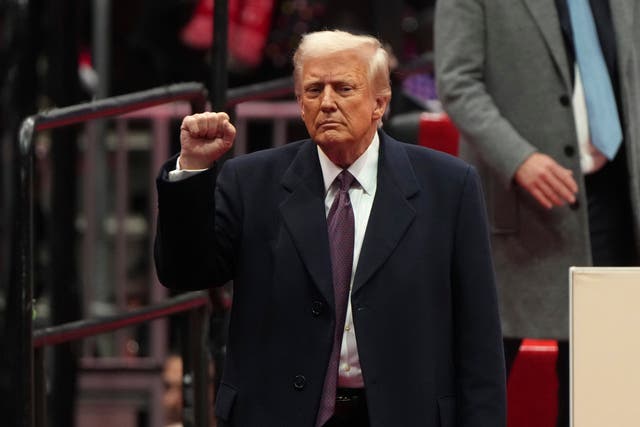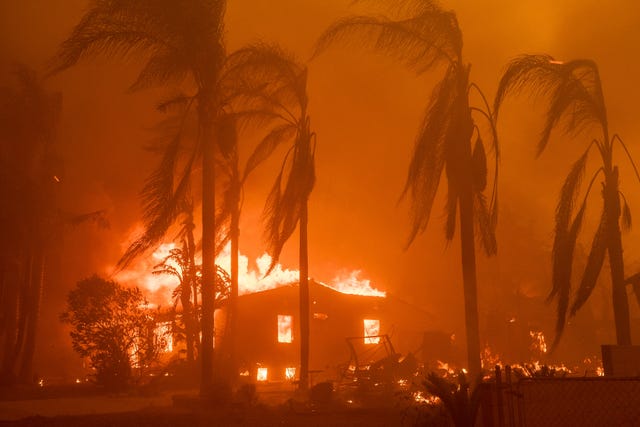Trump signs executive order directing US withdrawal from Paris climate agreement
Mr Trump’s action, hours after he was sworn in to a second term, echoed his directive in 2017.

President Donald Trump signed an executive order on Monday directing the United States to again withdraw from the landmark Paris climate agreement, dealing a blow to worldwide efforts to combat global warming and once again distancing the US from its closest allies.
Mr Trump’s action, hours after he was sworn in to a second term, echoed his directive in 2017, when he announced that the US would abandon the global Paris accord.
The pact is aimed at limiting long-term global warming to 1.5C above pre-industrial levels or, failing that, keeping temperatures at least well below 2C above pre-industrial levels.
Mr Trump also signed a letter to the United Nations indicating his intention to withdraw from the 2015 agreement, which allows nations to provide targets to cut their own emissions of greenhouse gases from the burning of coal, oil and natural gas.
Those targets are supposed to become more stringent over time, with countries facing a February 2025 deadline for new individual plans. The outgoing Biden administration last month offered a plan to cut US greenhouse gas emissions by more than 60% by 2035.
Mr Trump’s order says the Paris accord is among a number of international agreements that do not reflect US values and “steer American taxpayer dollars to countries that do not require, or merit, financial assistance in the interests of the American people”.

Laurence Tubiana, of the European Climate Foundation and a key architect of the Paris accord, called the planned US withdrawal unfortunate but said action to slow climate change “is stronger than any single country’s politics and policies”.
The global context for Mr Trump’s action is “very different to 2017,” Mr Tubiana said on Monday, adding that “there is unstoppable economic momentum behind the global transition, which the US has gained from and led but now risks forfeiting”.
The International Energy Agency expects the global market for key clean energy technologies to triple to more than 2 trillion dollars (£1.62 trillion) by 2035, she said.
“The impacts of the climate crisis are also worsening. The terrible wildfires in Los Angeles are the latest reminder that Americans, like everyone else, are affected by worsening climate change,” Mr Tubiana said.
The world is now long-term 1.3C above mid-1800s temperatures. Most but not all climate monitoring agencies said global temperatures last year passed the warming mark of 2.7 degrees Fahrenheit, and all said it was the warmest year on record.
The withdrawal process from the Paris accord takes one year. Mr Trump’s previous withdrawal took effect the day after the 2020 presidential election, which he lost to Mr Biden.
While the first Trump-led withdrawal from the landmark UN agreement — adopted by 196 nations — shocked and angered nations across the globe, “not a single country followed the US out the door,” said Alden Meyer, a longtime climate negotiations analyst with the European think tank E3G.
Instead, other nations renewed their commitment to slowing climate change, along with investors, businesses, governors, mayors and others in the US, Mr Meyer and other experts said.
Still, they lamented the loss of US leadership in global efforts to slow climate change, even as the world is on track to set yet another record hot year and has been lurching from drought to hurricane to flood to wildfire.
About half of Americans “somewhat” or “strongly” oppose US action to withdraw from the climate accord, and even Republicans are not overwhelmingly in favour, according according to a poll from The Associated Press-NORC Centre for Public Affairs Research.

Much of the opposition to US withdrawal comes from Democrats, but Republicans display some ambivalence as well. Slightly less than half of Republicans are in favour of withdrawing from the climate accord, while about two in 10 are opposed.
China several years ago passed the United States as the world’s largest annual carbon dioxide emitting nation. The US — the second biggest annual carbon polluting country — put 4.9 billion metric tonnes of carbon dioxide in the air in 2023, down 11% from a decade earlier, according to the scientists who track emissions for the Global Carbon Project.
But carbon dioxide lasts in the atmosphere for centuries, so the United States has put more of the heat-trapping gas that is now in the air than any other nation. The US is responsible for nearly 22% of the carbon dioxide put in the atmosphere since 1950, according to the Global Carbon Project.





